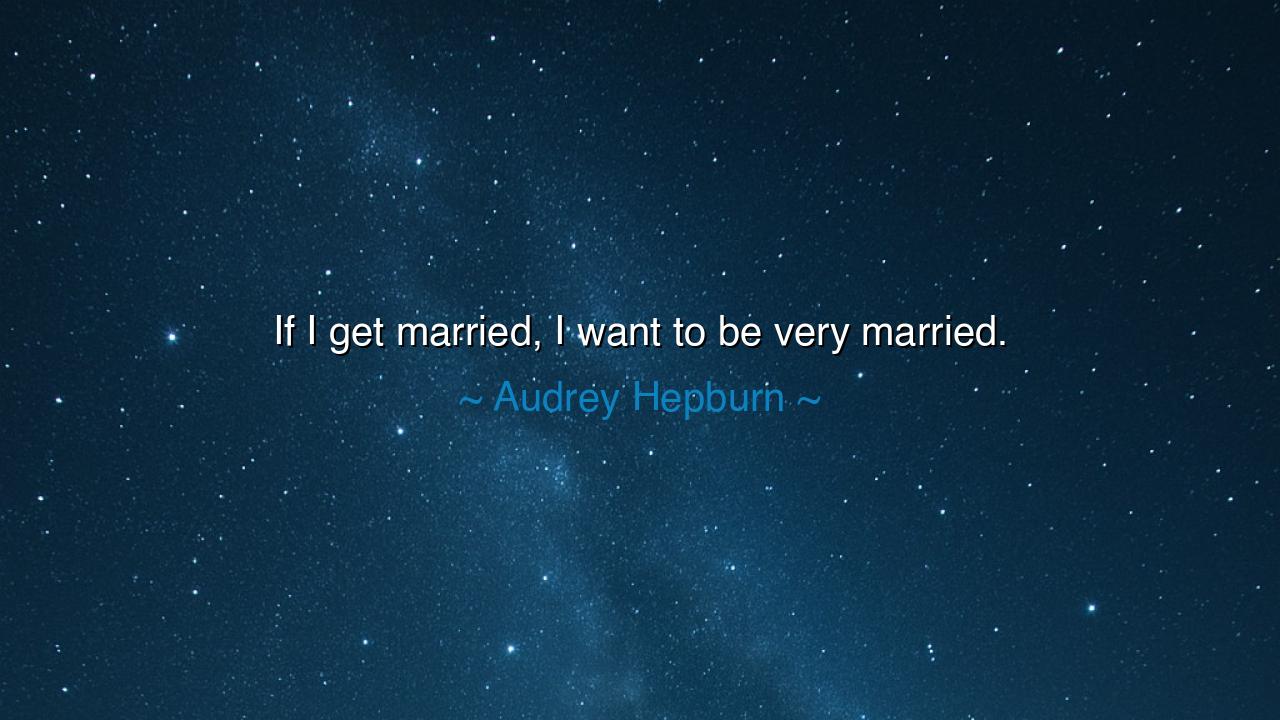
If I get married, I want to be very married.






When Audrey Hepburn said, “If I get married, I want to be very married,” she spoke with the rare sincerity of a soul who understood that love is not a costume to be worn lightly, but a sacred covenant to be lived fully. These words, simple yet profound, reveal her belief that marriage is not an arrangement of convenience, nor a fleeting romance bound by circumstance, but a complete union of heart, spirit, and purpose. In her quiet elegance, Hepburn expressed an ideal that echoes through the ages: that to love truly is to give oneself wholly, not halfway, to the one with whom your soul finds its reflection.
In the style of the ancients, one might say that Audrey spoke not as a star of the screen, but as a philosopher of the heart. Her statement carries the same wisdom found in the teachings of the old poets — that marriage, when entered with reverence, is a joining of destinies. To be “very married” is to make love a discipline, a daily act of devotion, and not merely a fleeting spark. It is to live in the spirit of commitment, where joy and struggle, laughter and sorrow, become the shared inheritance of two souls walking together toward eternity. Hepburn’s words remind us that love, to be real, must be complete — not a convenience, but a calling.
The origin of this quote lies in Hepburn’s own understanding of love shaped by a life of contrasts — beauty and hardship, fame and solitude. Having lived through the devastation of war, she came to value relationships not for glamour, but for depth. Though adored by millions, she longed not for adoration but for authentic connection. Her statement, spoken during an interview reflecting on love and marriage, was both a hope and a truth: that if love should come, it must come in its fullest form — steadfast, patient, and enduring. For Hepburn, whose grace was matched only by her humility, to be “very married” meant to love as wholly as one lives, without reservation or disguise.
History and legend offer us many examples of such complete devotion. Consider the story of Odysseus and Penelope, the ancient pair whose bond endured years of trial and separation. Odysseus, though tempted by glory and enchantment, never ceased to long for the home where Penelope waited, weaving faith into every thread of her loom. Their love was not soft or simple — it was tested by distance, time, and pain — yet it endured. This, too, is to be “very married”: to love not only in moments of comfort, but through every storm, to remain true when the world would pull you apart.
Audrey’s words also carry a quiet rebuke to the superficial. In a world where marriage can become a ceremony of appearances or a fleeting contract of convenience, she calls us back to the essence — the deep, abiding companionship of two people who choose, again and again, to belong to one another. To be “very married” is to live in continual renewal of promise — to wake each day and recommit, not because of obligation, but because love still feels sacred. It is to live not in perfection, but in persistence — to forgive, to learn, to build something lasting from the imperfection of two human hearts.
Her own life, too, reflects this yearning. Though her marriages faced trials, Hepburn’s later years were marked by a kind of spiritual partnership with Robert Wolders — a relationship built on deep trust and shared values. Through her humanitarian work with UNICEF, she lived the truth of her own saying: that love, once awakened, must be given wholly — whether to one’s partner, one’s children, or the suffering world. She showed that to be “very married” is not only to be faithful to another person, but to the idea of love itself — to nurture, protect, and serve with constancy.
The lesson in Hepburn’s words is timeless: if you love, love deeply. Do not enter the sacred bond of marriage lightly, as one dips a hand into water — but plunge into it with your whole being. To be “very married” is to see love not as a fleeting joy, but as a sacred labor, a journey where two souls grow together toward wisdom. It is to build not just a life, but a legacy of tenderness that outlives the years.
So, let her words ring as both challenge and blessing: if you choose to love, be all in. Do not love halfway, do not marry out of convenience or fear of loneliness, but out of the desire to become more together than you could ever be alone. For there is no beauty greater, no art more noble, than the art of being “very married” — wholly devoted, deeply kind, and forever faithful to love’s eternal promise.






AAdministratorAdministrator
Welcome, honored guests. Please leave a comment, we will respond soon